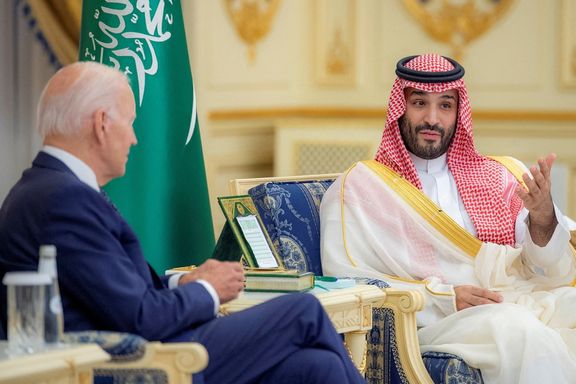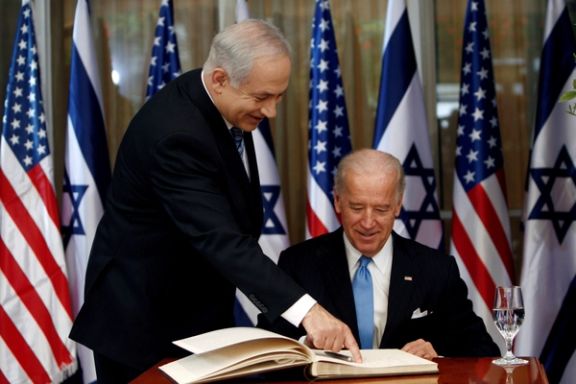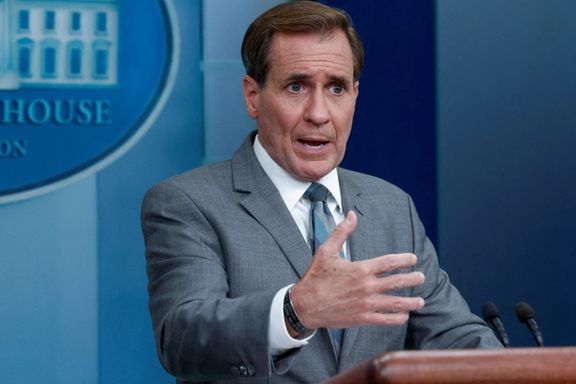How Close Is US In Brokering Saudi-Israel Normalization?

The United States is pushing for a deal between Israel and Saudi Arabia, the success of which can further isolate the Islamic Republic of Iran in the region.

The United States is pushing for a deal between Israel and Saudi Arabia, the success of which can further isolate the Islamic Republic of Iran in the region.
Iranian government-controlled media have labeled any potential Saudi Israeli deal a regional security threat, seeing the clear implications of a broad pro-West front emerging in the Middle East. Some analysts in Iran have said that Riyadh anticipating a l agreement with Israel, restored diplomatic relations with Tehran in March.
Axios on Wednesday cited four Israeli and US officials as saying that Israeli Prime Minister Benjamin Netanyahu seeks to get a security agreement with the US focused on deterring Iran in the context of the mega-deal the Biden administration is trying to broker with Riyadh and Jerusalem.
According to the report, Netanyahu brought up the idea for a US-Israeli security agreement during his last phone call with President Biden in July, telling the American president that he wants to send his confidant and Strategic Affairs Minister Ron Dermer to Washington to present a proposal in detail.
The details of Netanyahu's proposed agreement are not known but Israeli officials say it focuses on US security guarantees around a possible military nuclear threat from Iran. According to these sources, Netanyahu sees the US-Israeli security agreement in the context of the broader deal the US is trying to reach with Saudi Arabia that would also include a Saudi-Israel normalization agreement.

The Biden administration and Saudi officials are also discussing a possible security agreement, but the Washington is reluctant to include a NATO-style Article 5 commitment, which Riyadh wants. Article 5 provides that if a NATO ally is the victim of an armed attack, each and every other member of the alliance will consider it as an armed attack against all members and will take the actions it deems necessary to assist the ally under attack.
According to an unnamed US official, the Biden administration did not accept the Saudi request but did agree to discuss what some US officials are calling an "article 4.5" commitment — a similar security guarantee that would fall short of the Saudi expectations but would still be significant.
Moreover, The Wall Street Journal reported on Wednesday that the US and Saudi Arabia have agreed on the broad contours of the deal for Saudi Arabia to recognize Israel in exchange for concessions that would help promote the creation of a Palestinian state and civilian nuclear help as well as the security guarantees.
The WSJ claimed that US officials are cautiously optimistic that Washington and Riyadh would hammer out the finer details of what would be “the most momentous Middle East peace deal in a generation” within the next nine to 12 months. However, they warned that they face long odds. “There’s a work plan to explore the elements of what this would be and test the boundaries of what’s possible,” said one senior US official.
The efforts for what the so-called ‘mega deal’ accelerated after Saudi Crown Prince Mohammed bin Salman met in Jeddah two weeks ago with Jake Sullivan, President Biden’s national security adviser.
Biden’s efforts to finalize the deal before the US presidential election campaign starts indicate Washington’s aspirations to remain a central player in the Middle East, perhaps to contain Iran, isolate Russia, and neutralize China’s bid to supplant Washington’s interests in the region.

Later on Wednesday, US National Security Council spokesman John Kirby said that negotiators still had a long way to go, something that Haaretz framed as White House throwing cold water on reports of Saudi-Israel normalization.
Emphasizing that the reports gave the impression that the discussions are farther along and closer to some sense of certainty than they actually are, Kirby said, "There are still a lot of conversations that have to occur before we get there. Bottom line: there's no agreed-to set of negotiations, there's no agreed-to framework to codify normalization or any of the other security considerations that we and our friends have in the region. But there is a commitment by the administration to keep talking and to keep trying to move things forward."
In an op-ed for the WSJ on Tuesday, Israeli Foreign Minister Eli Cohen confirmed that the US should give Saudi Arabia a guarantee to defend it against Iranian nuclear aggression as part of a normalization deal with Israel. Comparing Iran's potential nuclear threat to North Korea’s actual nuclear threat to South Korea, Cohen said, “The US defense commitment acts as South Korea’s deterrent against Northern aggression. A comparable American defense pledge could reassure Middle Eastern nations, primarily Saudi Arabia and the Persian Gulf states.”
While US, Israeli, and even Saudi officials – such as Foreign Minister Faisal bin Farhan – believe that normalizing ties between Jerusalem and Riyadh would bring significant benefits to the region, Iran -- quite counterintuitively – keeps warning regional countries against it as efforts to expand the Abraham Accords to include Saudi Arabia seem likely to bear fruits.